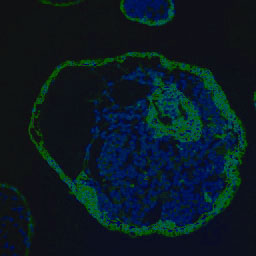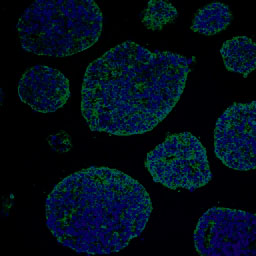Our lab focuses on the effects of the physical microenvironment on stem cell fate utilizing engineered systems that control cellular configurations and apply mechanical forces. We take an interdisciplinary approach, working with basic scientists, engineers, and clinicians in both academia and industry, to answer questions and address issues in stem cell mechanobiology, stem cell bioprocessing, and tissue engineering.
Stem Cell Mechanobiology

Currently the mechanoresponse of stem cells is still poorly characterized. In vivo, the niche maintains stem cells with changes in the chemical and physical microenvironment resulting in differentiation. These projects use defined culture environments and bioreactor systems to control physical configurations and apply mechanical stresses and strains. Molecular and cellular responses in these in vitro systems are then interpreted, including context from developmental biology, to identify the signaling pathways that govern self-renewal and differentiation processes.
Stem Cell Bioprocessing / Biomanufacturing

Translating stem cell research into applications for routine use requires the production of large numbers of consistently high quality cells. Our efforts in stem cell manufacturing focus on biomechanics and its role in scaleable production systems, devices for cell delivery, and studies in potency and dose. Synergistic efforts aim to purify heterogenous populations by sorting for specific phenotypes using low-cost high-throughput methods. Studies related to the quality of stem cells on functional potency include investigation into the effect of donor age for stem cell products.
Tissue Engineering and Regenerative Medicine

Cardiovascular and orthopaedic engineered tissues, such as vascular grafts and cartilage, can serve as clinical therapies and in vitro test systems. We focus on the in vitro role of biomechanics for modulating cell and tissue properties, preconditioning for improved in vivo functionality, and establishing physiologically relevant tissue models. Current projects include using stresses and strains to direct differentiation towards phenotypes to address cell sourcing shortages for transplantation, investigating the effects of mechanical modulation on stem cells for use in vascular grafts, and preconditioning of stem cells for improved vasculogenesis in ischemic tissues.
